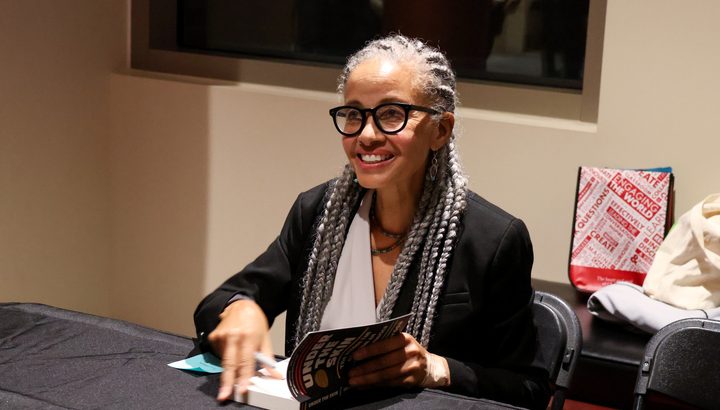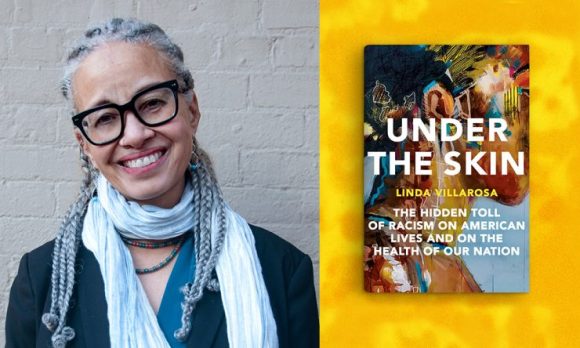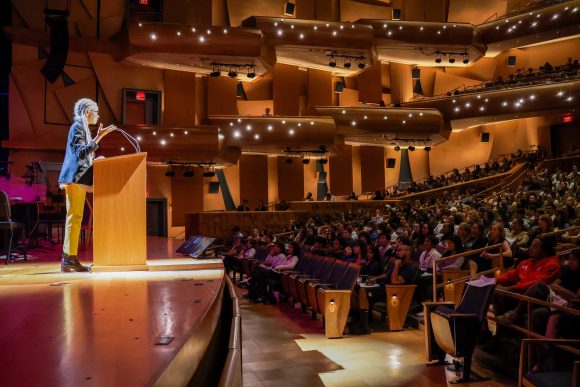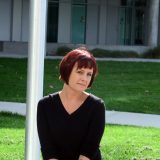
“People Dying is Expensive:” Linda Villarosa on Health Inequity and Racism in America
October 2, 2023
 Linda Villarosa loves numbers. As a veteran journalist, activist, educator, and award-winning author, the data she has spent years acquiring is central not only to her work, but to the health of Black Americans.
Linda Villarosa loves numbers. As a veteran journalist, activist, educator, and award-winning author, the data she has spent years acquiring is central not only to her work, but to the health of Black Americans.
“I’m a numbers nerd,” Villarosa shared with a packed audience at Chapman University’s Musco Center for the Arts. “I’m good with that.”
Villarosa spoke on her book, Under the Skin: The Hidden Toll of Racism on Health in America, on Sept. 26 as a part of the Wilkinson College of Arts, Humanities and Social Sciences’ Engaging the World series. ETW focuses on a different social issue every year – the theme for 2023 is “Leading the Conversation on Health Equity,” with Crean College of Health and Behavioral Sciences as a co-sponsor.
“People dying is expensive,” Villarosa told the audience, her response to the often-heard argument that it would cost too much to make changes to the healthcare system.
“It’s a system that is broken. There are not enough Black doctors. If there is a dearth of Black physicians, that is a problem,” said Villarosa. “Until we can fix the institution that is America, we have to take care of ourselves as individuals while we continue to fight discrimination.”
“Each year, we select a major figure who is moving the needle on social justice as our keynote speaker for our Engaging the World: Leading the Conversation series. This year for our health equity theme we selected Professor Villarosa because her journalistic investigations have been hugely influential in shining a light on the racial stereotypes and bias within the healthcare system that have become a life or death issue for people of color in the United States,” noted Wilkinson College Dean Jennifer D. Keene.
“When Villarosa spoke about her Black neighbor that needed to take a signed copy of Under The Skin with her to the hospital just to be taken seriously, it really emphasized to me the added obstacles in place for Black people in our healthcare system,” said Lauren Moyle (Creative Writing/History ‘24)
“Villarosa’s ability to shed light on a topic that is difficult to discuss and has never truly been taken in a positive light, is something to recognize wholeheartedly,” said Kaitlyn Clark (Psychology ‘26), who read Under the Skin and attended the event along with the rest of her class. “She truly made me feel heard…Linda Villarosa exemplifies everything I hope to be when I am older.”
The issue of health inequity in the United States and the too often-unrecognized racism that fuels it is the throughline of Villarosa’s book and lecture.
“Even if you are living it, you don’t always want to talk about it. Because it hurts,” Villarosa said.
Health disparities between Black and white Americans have been treated as a mystery, explained away as solely an issue of class and education, or attributed to myths about Black bodies. Under the Skin—and all Villarosa’s work—reveals that the impact of racism on daily life, medical ignorance and discrimination, environmental racism, and government neglect are the real cause behind the suffering of Black Americans.
“Yes, as far as health goes, socioeconomic status and education matter, but they are not the whole story,” Villarosa writes in Under the Skin “The lived experience of being Black in America, regardless of income and education, also affects health.”
“This is really why I started to write my book,” Villarosa explained. In her lecture, she presented the fact that Black people are 3 to 4 times more likely to die related to pregnancy and childbirth than white people. Black babies are 2.4 times more likely to pass away before age one, and a Black person with a college degree is more likely to die in childbirth than their white counterpart with an 8th grade education or less.
The most common explanation for these disparities, she noted, is blame, and the blame is twofold. One, it is believed that there is something different about Black bodies that is causing the issue. Two, it is believed that Black people are doing something wrong to create poor health outcomes.
“Myths about Black bodies are a remnant from slavery,” said Villarosa. “The idea that we as a demographic are doing something wrong, was used to justify the cruelties that were enriching our nation…This has nothing to do with us as people. We did nothing wrong. This is a systemic, institutional problem.”
Racism, Villarosa presented, is a risk marker for discrimination, ill treatment, disruption, fear and stress that shortens lives and also makes pregnancy and childbirth dangerous. “Weathering,” as she explained, is a phenomenon conceptualized by Arline Geronimus (a public health researcher at the University of Michigan) that explains how racial, gender, and other inequalities fuel a chronic, stress related, accelerated aging. It is “weathering” that Villarosa believes caused her experience with intrauterine growth restriction, and the premature birth of her daughter, during what should have been a normal, healthy pregnancy.
It is discrimination in the health care system itself that she pointed to as being particularly harmful to Black people. Unequal Treatment, published in 2003 by the National Academy of Sciences, she explained, found widespread bias against Black patients and other patients of color after looking at 483 different studies.
Villarosa’s face lit up as she pointed to the final slide of her presentation—images of her pre-med students at The City University of New York. It is their vision for the future of healthcare that gives her hope and keeps her optimistic.
“I am so proud to be a part of their growth.We have to support them. We can’t leave them out there by themselves. We have to support the activism happening now.”
(Header photo by: Ava Brandt)


